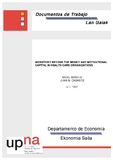Mostrar el registro sencillo del ítem
Incentives beyond the money and motivational capital in health care organizations
| dc.creator | Berdud, Mikel | es_ES |
| dc.creator | Cabasés Hita, Juan Manuel | es_ES |
| dc.date.accessioned | 2016-05-10T07:40:24Z | |
| dc.date.available | 2016-05-10T07:40:24Z | |
| dc.date.issued | 2012 | |
| dc.identifier.uri | https://hdl.handle.net/2454/20610 | |
| dc.description.abstract | This paper explores the conditions that characterize the optimality for a principal (health manager) to undertake investments to motivate agents (doctors). In the model, doctors are intrinsically motivated and can have different identities. We develop a principal agent dynamical model with moral hazard, which captures the possibility of affecting doctors’ intrinsic motivation and identity through contracts offered by the health manager. Identity and intrinsic motivation of the doctor can be undermined (crowding-out) or enhanced (crowding-in) by incentive policies and monetary rewards. When motivations beyond the money play a role in the agents behaviour, the optimality of the equilibrium outcomes may be altered. Intrinsic motivation is defined as doctor’s experienced enjoyment from doing her work and commit toward a mission. By “full” identity we mean a situation in which the doctor shares the organizational objectives and views herself as a part of the organization. We assume that “full” identity can be achieved when health managers include mission supportive investments in contracts. This also crowds in intrinsic motivation. However, crowding out occurs when the health manager uses only pure monetary rewards to incentivize doctors with the goal of drive their actions in his own interest. Solving the model, we are allowed to make comparative statics and discuss the conditions under which spending resources to invest in motivational capital, is optimal for the health organization’s manager. Our results may help to inform policy-makers about optimal policy design and optimal management of health organizations. For instance, we conclude that investing in motivational capital is more likely to be profitable in the long run whereas mere monetary incentives are more likely to be optimal in the short run. | en |
| dc.description.sponsorship | The authors acknowledge financial support from the Spanish Ministry of Science and Innovation (Project ECO2009-12836). | en |
| dc.format.extent | 44 p. | |
| dc.format.mimetype | application/pdf | en |
| dc.language.iso | eng | en |
| dc.relation.ispartofseries | Documentos de Trabajo DE - ES Lan Gaiak | es |
| dc.relation.ispartofseries | 1201 | en |
| dc.rights | CC Attribution-NonCommercial-NoDerivatives 4.0 International (CC BY-NC-ND 4.0) | en |
| dc.rights.uri | https://creativecommons.org/licenses/by-nc-nd/4.0/ | |
| dc.subject | Contracts | en |
| dc.subject | Moral hazard | en |
| dc.subject | Intrinsic motivation | en |
| dc.subject | Crowding effects | en |
| dc.subject | Motivational capital | en |
| dc.title | Incentives beyond the money and motivational capital in health care organizations | en |
| dc.type | Documento de trabajo / Lan gaiak | es |
| dc.type | info:eu-repo/semantics/workingPaper | en |
| dc.contributor.department | Economía | es_ES |
| dc.contributor.department | Ekonomia | eu |
| dc.rights.accessRights | Acceso abierto / Sarbide irekia | es |
| dc.rights.accessRights | info:eu-repo/semantics/openAccess | en |
| dc.relation.projectID | info:eu-repo/grantAgreement/MICINN//ECO2009-12836/ES/ | en |



